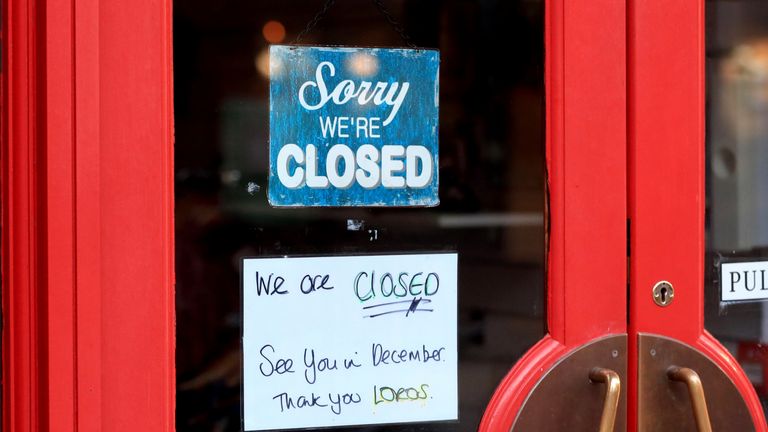COVID-19: Number of businesses currently trading lowest since June as lockdowns bite
Figures from the Office for National Statistics show the hospitality sector suffering the most from lockdown closures.
Thursday 14 January 2021 17:05, UK
The proportion of UK businesses currently trading has fallen to 71%, its lowest level since the end of the first lockdown, new figures show.
Office for National Statistics (ONS) data covering 29 December to 10 January showed the figure has fallen from 84% just before Christmas as new COVID restrictions took effect.
The figure had been at more than 80% since the end of the summer after many businesses reopened, apart from a dip to 77% during November's month-long lockdown.
"This decrease in the percentage of businesses currently trading is likely because of changes in coronavirus restrictions over the reference period," the ONS said.
It was last lower than its current level in June, the month when non-essential retailers were allowed to reopen their doors after the initial measures were eased.
The latest figures showed that 27% of firms had "temporarily closed or paused trading", while 2% had closed permanently.
They showed hotels, restaurants and pubs were the worst hit, with just 37% of firms in that sector operating at the start of this year, even lower than in June when the data series began.
A third of businesses within accommodation and food and other services - including hair and beauty operators - had little or no confidence they would survive the next three months, the ONS said, echoing earlier findings.
Estate agents and education businesses were the least likely to have stopped trading.
The figures also showed that the proportion of employers' workforces on furlough leave had climbed from 11% to 14% over the Christmas period.
In addition, businesses have had to contend with trade disruption at ports, which intensified last month when France imposed a ban on travel from the UK.
Figures for 14-27 December showed that 25% of firms involved in overseas trade had reported that the border disruption had affected their ability to import goods or services, while 18% said it had affected exports.
The ONS data comes as Britain faces the prospect of a double-dip recession, with experts predicting lockdowns are likely to have pulled the economy into reverse over the last three months of 2020 and the first quarter of this year.
Monthly GDP figures due on Friday are expected to show it shrank by 5.7% in November.
Britain suffered its worst recession on record earlier in the year as the first COVID-19 lockdown crushed economic activity.
An official forecast in November suggested GDP fell by more than 11% over the year as a whole, which would make it the biggest annual collapse in three centuries.
Chancellor Rishi Sunak has extended furlough measures - subsidising wages for temporarily laid-off workers - into the spring and announced billions more pounds worth of grants to help the hardest hit firms, but there have been calls for the government to do more.







